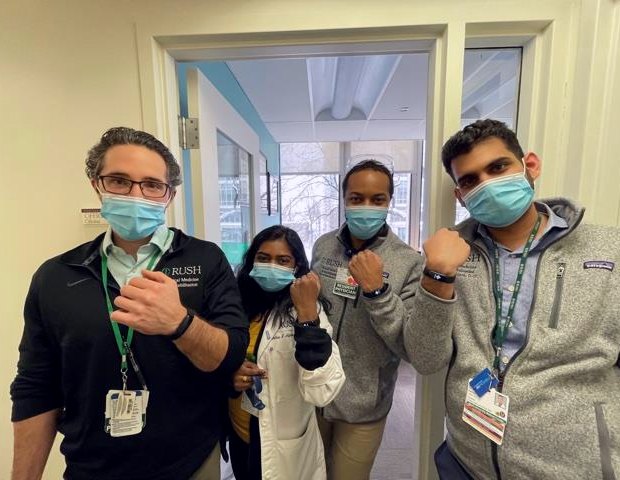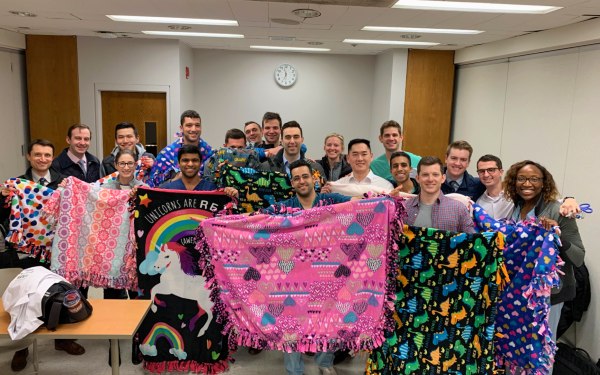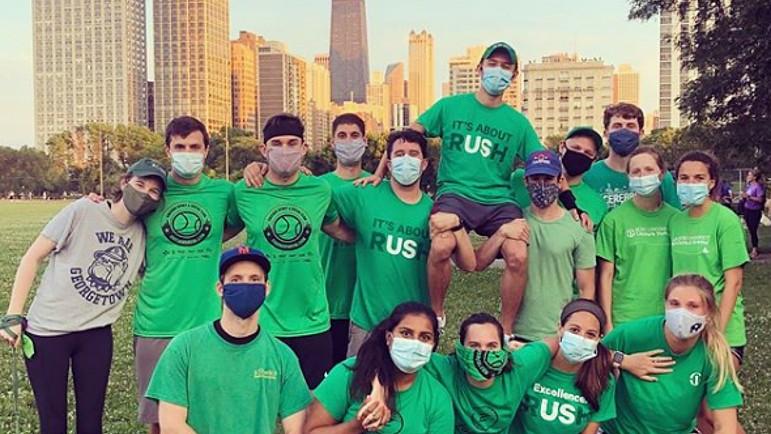Graduate Medical Education (GME) at Rush University is committed to providing quality academic and experiential resources to all of its residents and fellows. However, caring for patients and community members can be an extremely stressful task, especially during the COVID-19 pandemic.
As part of House Staff Appreciation Week, we are highlighting a few of the GME programs across the institution that have developed wellness initiatives for its trainees to preserve and better the health of its most dedicated medical professionals.
Pediatrics
In July 2017, the pediatric residency program introduced a wellness rotation as part of the curriculum for the PGY-2 year. The rotation was created to improve resilience and combat increasing rates of burnout in the program.
This four-week rotation is intended to give residents the opportunity to invest time in self-care and improve work-life balance. During the rotation, residents are highly encouraged to make at least one primary care or obstetrics/gynecology appointment, check in with the staff psychologist and schedule a visit at Rush’s Center for Clinical Wellness. They are also required to create a board exam study plan, work on their mandatory quality improvement project and meet with their career advisors.

During the rotation, clinical duties are limited to weekly continuity clinic. This allows the wellness resident to be available to provide coverage for any other pediatric resident with a wellness need, including mental health appointments, doctor or dental visits.
“The wellness rotation is such a great reset. It is strategically scheduled between two of our busiest rotations and really allowed me to catch up on those ‘life things’ that sometimes get put on the back burner when we’re busy,” said Jessica Wyka, MD, chief resident in the department. “Along with scheduling routine check-ups, I was able to establish a good exercise routine, which I carried forward even when I got busier. As an added bonus, it allowed me to rest up before an ICU month, which I think really cuts down on burn out.”
Since the rotation’s implementation, the program has observed a sustained reduction in resident burnout during the PGY-2 and PGY-3 years, as defined by the Maslach Burnout Inventory (MBI). Residents appear to be requesting their own health coverage more often as a result of the wellness rotation.
In addition to the wellness rotation, the pediatric residency maintains a robust, longitudinal wellness curriculum including monthly house staff meetings to receive feedback and discuss improvements for the residency, quarterly confidential class meetings with a staff psychologist and annual retreats for each class during which residents are excused from clinical duties. Clinical rotations are also optimized by alternating more strenuous months with call-free months and minimizing cross-coverage duties.
Physical Medicine and Rehabilitation
The Department of Physical Medicine and Rehabilitation also instituted a unique wellness initiative structured around a “Wellness Wheel.” The wheel includes seven elements of wellness: social, physical, emotional, spiritual, occupational/intellectual, environmental and financial. To ensure that all residents in the department took advantage of the program, initiative leaders took an individualized and group approach.
Residents are required to meet with program leadership quarterly to discuss any acute or chronic issues related to their wellness. If an issue is identified, a plan incorporating the Rush Center for Clinical Wellness is created. Individual conversations highlighted systemic issues with rotations, scheduling and other components of the program that could be negatively impacting other residents. Concerns regarding widespread issues impacting wellness within the program are brought to faculty meetings.
Over the last two years, the physical medicine and rehabilitation department adjusted call schedules, clinical rotations and protocols for excusing residents for wellness issues to improve resident wellness. The department also established the Intradepartmental Wellness Subgroup, which includes faculty and members of each residency class interested in wellness. The subgroup assisted in reallocating residency department funds towards wellness-themed initiatives such as teambuilding events and dinners, birthday lunches for each resident, creating a wellness library in the resident room and initiating a FitBit challenge.
The department’s wellness initiatives were recently highlighted in in the Winter 2021 issue of Physiatry Forward.
Orthopedics

The Department of Orthopedics also has a dedicated wellness initiative focused on forming meaningful connections with co-residents and faculty. In place of its regular didactic lecture, residents attend a bonding activity three times a year. Previous activities included bowling, bubble soccer and bow and arrow dodge ball.
The department also established a “blind date dinner,” during which five residents attend dinner with the residency program and a mystery guest.
“It is an amazing way for the residents to hang out with one another as well get to know the program director and another attending physician in way that they may not have the opportunity to do so otherwise,” said Monica Kogan, MD, FAOA, program director for the residency program. “The mystery of who the attending physician is keeps them guessing until they see them walk through the door.”
The department also organizes volunteer activities one to two times a year. In the past, these activities included making blankets for Child Life or serving dinner at the Ronald McDonald House.
Wellness Resources
For more information about Rush’s wellness resources, including making an appointment at the Rush Center for Clinical Wellness or learning more about the services provided by the Rush Wellness Assistance Program, please visit the Inside Rush wellness page (requires Rush credentials to access).

